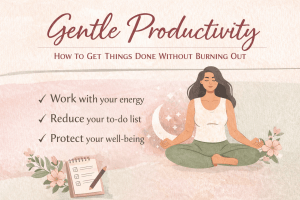Sleep is an essential part of our daily lives, yet it often doesn’t get the attention it deserves. We’re all familiar with the groggy mornings after a late-night Netflix binge or those hectic days when work or family commitments keep us up.
But did you know that consistently getting 7-8 hours of sleep is vital for optimal health?
In this post, we’ll explore the importance of sleep for health, dive into the benefits of a good night’s rest, and offer tips to help you achieve the perfect slumber.
Understanding the Science of Sleep
To truly appreciate the importance of sleep for health, it’s essential to understand how sleep works. Our sleep cycle comprises various stages: light sleep, deep sleep, and REM (rapid eye movement) sleep. Each stage plays a crucial role in our overall well-being.
During light sleep, our body relaxes, and our heartbeat and breathing slow down. Deep sleep is when our body repairs and regrows tissues, builds bone and muscle and strengthens the immune system. Finally, REM sleep is vital for cognitive functions like memory consolidation and emotional regulation.
The beauty of sleep is in its complexity. As we cycle through these stages multiple times a night, our brain and body undergo a series of processes that rejuvenate us. Thus, understanding this cyclical nature helps us recognize why the importance of sleep for health cannot be overstated.
Get restful sleep with Cushion lab’s deep sleep pillow. Get yours now!
The Health Benefits of Getting Enough Sleep
Getting enough sleep isn’t just about avoiding that cranky feeling in the morning. Quality sleep profoundly impacts various aspects of our health. First, it improves cognitive function and memory.
When we sleep, our brain processes and consolidates information from the day, which enhances learning and memory retention. This means a good night’s sleep can make us sharper and more focused.
Secondly, sleep plays a pivotal role in boosting our immune system. During sleep, our body produces cytokines—proteins that fight infection and inflammation. Without sufficient sleep, our body’s ability to fend off illnesses diminishes, leaving us more susceptible to colds and infections.
Furthermore, sleep is crucial for emotional regulation and mental health. Lack of sleep can lead to increased stress, anxiety, and even depression. By prioritizing sleep, we can maintain better emotional stability and a more positive outlook on life.
The Consequences of Sleep Deprivation
On the flip side, neglecting sleep can have severe consequences. In the short term, sleep deprivation can lead to irritability, poor concentration, and impaired judgment. We’ve all experienced those sluggish days when our brains feel like they’re in a fog.
But the long-term impacts of chronic sleep deprivation are even more alarming. Studies have shown that insufficient sleep is linked to an increased risk of chronic conditions like heart disease, diabetes, and obesity. It’s clear that the importance of sleep for health extends far beyond feeling rested.
Sleep deprivation also affects our hormonal balance, particularly the hormones that regulate appetite. When we don’t get enough sleep, our body produces more ghrelin (the hunger hormone) and less leptin (the satiety hormone), leading to increased cravings and potential weight gain.
How to Ensure You Get 7-8 Hours of Quality Sleep
Now that we understand the importance of sleep for health, the next step is to ensure we get those 7-8 hours of quality sleep each night. Here are some practical tips:
-
Establish a Consistent Sleep Schedule: Going to bed and waking up at the same time every day helps regulate your body’s internal clock. Even on weekends, try to stick to your schedule to avoid disrupting your sleep cycle.
-
Create a Sleep-Friendly Environment: Your bedroom should be a sanctuary for sleep. Keep it cool, dark, and quiet. Invest in a comfortable mattress and pillows, and remove any distractions, such as electronic devices, that might interfere with your rest.
-
Incorporate Relaxing Bedtime Routines: Develop a pre-sleep ritual to signal your body that it’s time to wind down. This could include activities like reading a book, taking a warm bath, or practicing relaxation techniques such as deep breathing or meditation.
Common Myths About Sleep
Several myths about sleep can lead to misconceptions about its significance. Let’s debunk some of these myths:
-
“You Can Catch Up on Sleep”: Many believe that they can make up for lost sleep on weekends. However, our bodies don’t work that way. Consistent sleep is vital for maintaining health, and catching up on sleep debt doesn’t have the same benefits as getting regular, quality sleep.
-
“Sleep Needs Decrease with Age”: While older adults may experience changes in sleep patterns, the need for restorative sleep remains crucial throughout life. The importance of sleep for health applies to everyone, regardless of age.
The Role of Diet and Exercise in Sleep Quality
What we eat and how we move can significantly impact our sleep quality. Certain foods and nutrients can promote better sleep. For instance, foods rich in tryptophan, such as turkey, eggs, and dairy products, can help induce sleep by increasing the production of serotonin and melatonin.
Regular physical activity also plays a key role in maintaining healthy sleep patterns. Exercise can help regulate your sleep-wake cycle and reduce symptoms of insomnia. However, it’s essential to time your workouts appropriately. Exercising too close to bedtime can have the opposite effect, making it harder to fall asleep.
Conclusion
In conclusion, sleep is a vital aspect of our overall health and well-being. By understanding the importance of sleep for health and prioritizing those 7-8 hours of rest each night, we can improve our cognitive function, strengthen our immune system, and maintain better















